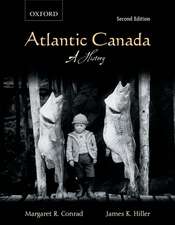Debating Foreign Policy in Eighteenth-Century Britain
Autor Jeremy Blacken Limba Engleză Hardback – apr 2011
Preț: 1061.06 lei
Preț vechi: 1293.97 lei
-18% Nou
Puncte Express: 1592
Preț estimativ în valută:
203.06€ • 211.21$ • 167.64£
203.06€ • 211.21$ • 167.64£
Carte tipărită la comandă
Livrare economică 14-28 aprilie
Preluare comenzi: 021 569.72.76
Specificații
ISBN-13: 9780754658672
ISBN-10: 0754658678
Pagini: 266
Dimensiuni: 156 x 234 x 16 mm
Greutate: 0.64 kg
Ediția:1
Editura: Taylor & Francis
Colecția Routledge
Locul publicării:Oxford, United Kingdom
ISBN-10: 0754658678
Pagini: 266
Dimensiuni: 156 x 234 x 16 mm
Greutate: 0.64 kg
Ediția:1
Editura: Taylor & Francis
Colecția Routledge
Locul publicării:Oxford, United Kingdom
Notă biografică
Jeremy Black is Professor of History at the University of Exeter. Born in London, he studied at Cambridge, graduating with a Starred First, before doing postgraduate work at Oxford. From 1980 he taught at Durham University, eventually as professor, before moving to Exeter in 1996. His books include The British Seaborne Empire; Maps and History; George II and George III: America's Last King.
Recenzii
'Jeremy Black here provides a powerful and sweeping account of British foreign policy...' Journal of Modern History 'The suggestion of a nation’s foreign policy as a uniform and universally agreed-upon entity is commonly assumed in many works. Statements such as ’British foreign policy was... ’ imply a unity of effort, consensus of opinion and harmony between rival political leaders that in a democracy are seldom the reality and emerge only after immense effort and a messy, confrontational process. Jeremy Black’s Debating Foreign Policy in Eighteenth Century Britain is a masterful attempt to describe this process throughout the critical eighteenth century that witnessed Great Britain’s rise to European dominance... Jeremy Black is a brilliant scholar, and expects the reader to bring a great deal of knowledge to this examination... The latter half of the work, which is devoted to examining British foreign policy throughout the eighteenth century until the end of the Napoleonic era, will be the most useful for researchers, and shows the author’s mastery.' History
Cuprins
Note on Dates, Spelling and Titles; Preface; Prologue Documentary Culture and the Historian; List of Abbreviations; Chapter 1 Introduction; Chapter 2 The Mechanisms of Debate; Chapter 3 The Extent of Debate; Chapter 4 The Quality of Debate; Chapter 5 The New Age of War, 1689–1714; Chapter 6 A Continental Dynasty; Chapter 7 Rethinking Interventionism, 1740–55; Chapter 8 Strategic Culture and Imperial Warfare, 1754–63; Chapter 9 An Empire Under Challenge, 1763–83; Chapter 10 New Definitions and Problems, 1783–1815; Chapter 11 Conclusions;
Descriere
During the course of the eighteenth century Britain's status as a major maritime and commercial power steadily grew, and helped shape the global political, economic and military situation. Rather than offering a familiar narrative of Britain's eighteenth-century foreign policy, this book instead focuses upon how this policy was debated and viewed by British society. By probing the issues surrounding the need to define and discuss Britain's foreign policy in public contexts, this book offers a fascinating insight into questions of perceived national interest, and how this developed and evolved.








